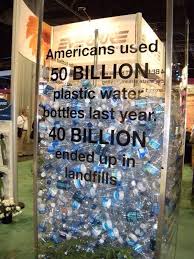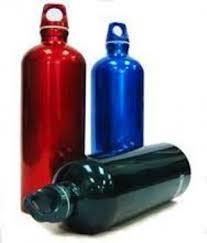Think Before You Drink…Bottled Water
Top up your reusable water bottle, not the landfill

“You cannot get through a single day without having an impact on the world around you. What you do makes a difference, and you have to decide what kind of difference you want to make.”
– Jane Goodall
Looking for an environmentally friendly idea to tap into? Here’s one: ditch the plastic water bottles and start getting your aqua at home.
An estimated 88% of plastic water bottles are NOT recycled in Canada — a number that’s as embarrassing as it is staggering.
With each Canadian consuming 60 litres of bottled water a year — and sales surpassing coffee, tea, and milk — this is a lot of plastic needlessly piling up in landfills.
In North America, it used to be that about 70 million plastic water bottles ended up in landfills each year.
Now check out the numbers (in the US alone):
Holy batman…that is a LOT of plastic water bottles!
Across the globe, close to 2.5 billion kilograms of plastic are used to bottle water every year. And this plastic can take as long as 1,000 years to biodegrade. In the process, toxic additives are leaching into the groundwater.
As for the amount of oil required to produce said plastic?
But wait, there’s more…
Footprint goes beyond the plastic
Unlike the water you get through your tap at home, bottled water has a bigger environmental footprint because it has to be transported over long distances. Instead of simply being piped into your glass in the kitchen, it arrives by truck, train, plane, and boat. And all these modes of transport require fossil fuels to get around.
And many bottled water brands actually use filtered tap water similar to the water you get at home anyway. Plus, residential tap water is more strictly tested (but not in Flint, Michigan!) and regulated than bottled water, so it makes little sense to buy something that is so plentiful and cheap at home.
Think of the money you’ll save
“Buying water in plastic bottles just does not make sense financially,” explains the Pays to Live Green website. “It can cost you as much as 2400 times as much to get your water in a one-time use bottle as opposed to getting it from the tap. The average bottle of water will cost you on average of $.79 compared to just 1/3 of a cent from your faucet.”
Here’s what you can do to minimize the impact of plastic water bottles:
1. Stop buying bottled water – or perhaps start by buying less
2. Recycle any disposable plastic water bottles you do use – versus throwing them in the garbage
3. Purchase a reusable water bottle and use it at work, on the road, in the gym, etc.
Taking these steps will help to keep more water where it should be — outside of a bottle. It will cut down on unnecessary waste in landfills by reducing some of the millions of plastic water bottles dumped daily.
So let’s ease up on automatically hitting the bottle and look for what’s on tap instead 🙂
Personally, I am a HUGE water drinker. I drink at least 2 litres of water a day. So you’ll rarely see me out and about with one of my two trusty Nalgene water bottles in tow. But on occasion, if I forget my water bottle or I run out of water (and there’s no place to refill it) then I will buy a disposable bottle of water. But I sure don’t like to 🙁
Other Face the Future blogs:
Let’s Make Using Reusable Hot Beverage Mugs COOL (Again)
Concerned About the Environment? Face the Future blog series begins Apr 22nd
Face the Future is an on-line environmental awareness campaign that raises awareness about how and why individuals can lessen their environmental footprint one step at a time. The 2016 blog series runs from Apr 22 to Jun 24. To receive the blogs via e-mail, here is the link to subscribe . Face the Future is an initiative of Pink Gazelle Productions Inc.






4 thoughts on “F the F #3 Disposable Water Bottles”
I’m far to cheap to buy water in bottles! Why waste money on something that comes out of your tap at a fraction of the cost? Living on a farm with well water we don’t need to pay municipally for our water but we do have an iron filter, water softener and RO system. So there is some cost to having our water flow out of our taps. Can’t imagine even wanting to pack that many water bottles in from the grocery stores all the time.
No kidding, eh?!
Maryanne
I am now trying not to buy bottled water as much as possible. I have my own water bottle which I always carry with me. I also believe that by doing these, I can help save the environment and save me as well from expenses and harzardous chemicals found in the bottled water.
Excellent to hear! Every little bit helps 🙂
I left one of my Nalgene water bottles at a rest stop in Oregon on a road trip last weekend…arghhh!!